Во периодот од 7 до 10 јуни 2022 година во рамките на „Пилот-проект за Систем за рано предупредување за исчезнати деца“, спроведуван од Новинари за човекови права и управуван од партнер организацијата ЕКПАТ-Австрија, беше спроведена првата студиска посета за размена на искуства за институционални претставици од земјава.
Студиската група во состав: Филип Спировски – претставник на Новинари за човекови права, Светлана Цветковска – раководител во секторот за еднакви можности во Министерството за труд и социјална политика, Емилија Гиноска – помлад соработник за меѓународна соработка и односи со јавноста во Агенција за заштита на лични податоци, Сашко Сирачевски – главен инспектор во Националната единица за сузбивање на криумчарење мигранти и трговија со луѓе при Сектор за криминалистички истраги во Оддел за сузбивање на организиран и сериозен криминал – МВР, и Василка Попѓорѓиева – раководител на Секторот за правни и општи работи во Агенција за заштита на правото на слободен пристап до информации од јавен карактер, имаа можност да се запознаат со процесите и програмите за пријавување, и справување со исчезнати лица и деца.
Првата посета започна во Федералното Министерство за социјални работи, здравство, грижа и заштита на потрошувачите кое финансиски го поддржува проектот. Добредојде ни посака г. Харалд Фугер, во попладневните часови на 7. Јуни. До 21 часот слушнавме најнови податоци и добивме сознанија за работата на министерството во сите сфери во кое делува. Заклучок беше дека министерството вложува огромни средства за благосостојба на граѓаните, не оставајќи зад себе никој. Најголем интерес од излагањето покажа г-ѓа. Цветковска Светлана, раководител во секторот за еднакви можности, при Министерството за труд и социјална политика на Република Северна Македонија. Не изостанаа критиките на своја сметка , навистина минорни но јасни: во однос на ЕУ легислативата и примената од страна на Австрија. На состанокот присуствуваа и Астрид Винклер, Сони Шварц и Ванеса Мозер од ЕКПАТ Австрија, партнер организација во проектот. Нивната вклученост се однесува на организирање на тренинзи кон засегнатите страни поделени во три групи: институции, НВОи и медиуми, како и комплетната организација на првата од трите предвидени студиски посети соодветно.
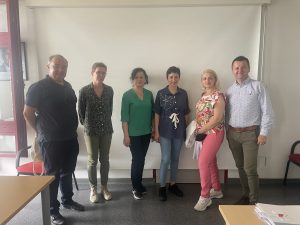 На 8. Јули започнавме со посета на Сојузниот отсек за криминал каде има 3600 вработени, домаќин беше Криста Бауер, службеник со 20 годишно искуство. Од опсежната но многу прецизна презентација се запознавме со процедурите при постапување по пријави за исчезнати лица. Веднаш се постапува во случај на пријава – опасност од самоубиство, поради здравствени причини или по барање на родител – старател. Сето ова зачинето со одличен информациски документ менаџмент систем (паперлес!) ја прави службата уште поефикасна. Беше потенцирана соработката со Еупол и со Интерпол чии бази на податоци кои се составни елементи во процедури предвидени однапред и прецизно. Се споменаа и разликите помеѓу Виена и провинциите, потребата од повеќе тренирани полицајци, сензибилизирање на медиумите да помогнат со емисии наменети за широката јавност (тв серии и сл.) На денот на исчезнати лица 25. Мај, секоја година се повикува на потребата од поголема грижа на пошироката јавност кон нив. Беше кажано дека исчезнатото лице не може да биде уапсено! Интересно е што и лицата со деменција се потенцијални исчезнати лица и кон нив е наменета посебна стратегија, како и кон тинејџерите. Транзитирањето на непридружувани малолетници заради принуден брак како проблем го споделуваат и со Авиокомпаниите, во тој контекст беа споменати и други адвертајзинг приоди за барање на исчезнатите.
На 8. Јули започнавме со посета на Сојузниот отсек за криминал каде има 3600 вработени, домаќин беше Криста Бауер, службеник со 20 годишно искуство. Од опсежната но многу прецизна презентација се запознавме со процедурите при постапување по пријави за исчезнати лица. Веднаш се постапува во случај на пријава – опасност од самоубиство, поради здравствени причини или по барање на родител – старател. Сето ова зачинето со одличен информациски документ менаџмент систем (паперлес!) ја прави службата уште поефикасна. Беше потенцирана соработката со Еупол и со Интерпол чии бази на податоци кои се составни елементи во процедури предвидени однапред и прецизно. Се споменаа и разликите помеѓу Виена и провинциите, потребата од повеќе тренирани полицајци, сензибилизирање на медиумите да помогнат со емисии наменети за широката јавност (тв серии и сл.) На денот на исчезнати лица 25. Мај, секоја година се повикува на потребата од поголема грижа на пошироката јавност кон нив. Беше кажано дека исчезнатото лице не може да биде уапсено! Интересно е што и лицата со деменција се потенцијални исчезнати лица и кон нив е наменета посебна стратегија, како и кон тинејџерите. Транзитирањето на непридружувани малолетници заради принуден брак како проблем го споделуваат и со Авиокомпаниите, во тој контекст беа споменати и други адвертајзинг приоди за барање на исчезнатите.
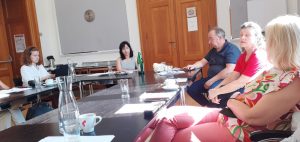 Попладневната сесија беше одржана повторно во зградата на Федералното Министерство за социјални работи, здравство, грижа и заштита на потрошувачите. Презентер беше Кристијан Мадер, полицаец и претседател на здружението „Австрија ве наоѓа“. Презентацијата даде објаснување за работата на здружението кое работи во насока на пронаоѓање на исчезнати лица. Принципот на работа е следен: само по пријавување во полиција на исчезнатото лице и пополнување на формуларите таму, здружението може да внесе пријава во својата датабаза, зборуваат со давателот на информацијата и со фамилијата, ги утврдуваат фактите. Одржуваат постојан контакт и пружаат техничка помош на роднините. На крајот тесно соработуваат со полицијата т.е. им даваат и нив информации, се со цел за побрзо пронаоѓање на исчезнатото лице. Имаат окулу 11000 пријави годишно. Но, шеесетина се активни случаи. Не се поврзуваат т.е. немаат пријави од градинки и школи. Она што посебно беше истакнато беше важноста за воспоставување на доверба. Довербата е клучот за успех. Детално беше пополнет замислен профил на исчезнато лицена веб страната. Покрај веб страната беше презентирана и ФБ страната на организацијата, која во моментот има 27000 следбеници.
Попладневната сесија беше одржана повторно во зградата на Федералното Министерство за социјални работи, здравство, грижа и заштита на потрошувачите. Презентер беше Кристијан Мадер, полицаец и претседател на здружението „Австрија ве наоѓа“. Презентацијата даде објаснување за работата на здружението кое работи во насока на пронаоѓање на исчезнати лица. Принципот на работа е следен: само по пријавување во полиција на исчезнатото лице и пополнување на формуларите таму, здружението може да внесе пријава во својата датабаза, зборуваат со давателот на информацијата и со фамилијата, ги утврдуваат фактите. Одржуваат постојан контакт и пружаат техничка помош на роднините. На крајот тесно соработуваат со полицијата т.е. им даваат и нив информации, се со цел за побрзо пронаоѓање на исчезнатото лице. Имаат окулу 11000 пријави годишно. Но, шеесетина се активни случаи. Не се поврзуваат т.е. немаат пријави од градинки и школи. Она што посебно беше истакнато беше важноста за воспоставување на доверба. Довербата е клучот за успех. Детално беше пополнет замислен профил на исчезнато лицена веб страната. Покрај веб страната беше презентирана и ФБ страната на организацијата, која во моментот има 27000 следбеници.
На 9. Јули претпладневната сесија се одржа во просториите на невладината организација Азилкоординација Австрија. Домаќин беше Лиса Волфсегер која ги објасни состојбите со барателите на азил меѓу кои и непридружуваните малолетници. Најголем број во моментот, 70% се од Авганистан. Сместени се во посебни центри и не се водат како заробеници. Имаат можност слободно да се движат. Лиза им помага со правни совети и постапки. 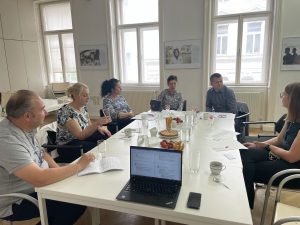 Имале 5605 случаи во 2021г. А до сега во 2022 имаат 2167 случаи. Посредуваат во одредување на законски застапник на непридружувани малолетници, а во втора фаза им бараат и сместување. Бидејќи повеќе од половина од азилантите продолжуваат понатаму им недостасува систем за следење понатаму. Беа споменати и правата на азилантите да ја донесат и фамилијата во Австрија. Азилантите кои исчезнуваат, (2021г имале 3123 случаи) не се водат како исчезнати лица во Австрија, т.е. случајот се затвара! Тоа го споменаа како критика, маана на системот.
Имале 5605 случаи во 2021г. А до сега во 2022 имаат 2167 случаи. Посредуваат во одредување на законски застапник на непридружувани малолетници, а во втора фаза им бараат и сместување. Бидејќи повеќе од половина од азилантите продолжуваат понатаму им недостасува систем за следење понатаму. Беа споменати и правата на азилантите да ја донесат и фамилијата во Австрија. Азилантите кои исчезнуваат, (2021г имале 3123 случаи) не се водат како исчезнати лица во Австрија, т.е. случајот се затвара! Тоа го споменаа како критика, маана на системот.
На последниот ден од четиридневната посета на Виена (беше најинтересен, – забелешка на учесниците) претпладнето ја посетивме НВО „Рат ауф Драт“ во чии рамки работи и сос линијата за исчезнати деца. Бригит Сатке и Кристијан Забади ни ја објаснија во детали нивната работа. Постојат 35 години, а од 2014 се во простории заедно со СОС Детското село. Се справуваат со 30000 повици годишно а тимот од 8 професионалци: психолози и педагози, работи 24/7. Најчести јавувачи се деца од 10 – 18 г но не одбиваат никој до 24 години старост. На онлајн линијата се јавуваат и родители. 80% деца – 20% родители. Машките повеќе се јавуваат онлајн, а девојчињата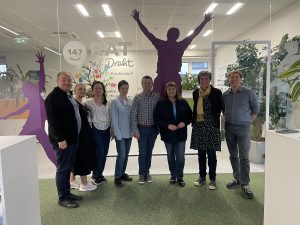 повеќе на чет и за совети. Окулу 5% од јавувањата се од наставници. За нивниот СОС број луѓето разбираат преку адвертајзинг на инфо скринови и 3- 5 пати неделно на медиуми во метроата, секаде бесплатно. (про боно). Најчести причини за јавување се фамилијарни проблеми, булинг или самоубиствени намери. Имаат можност за конференциска врска со полиција, а имаат и пристап до бројот кој се јавува. Имаат и повици од деца од центрите за азил. Повиците се 35% од Виена, 10% – 15% од горна и слично од долна Австрија. Линијата за исчезнати деца е дел од европската линија за исчезнати деца и оваа организација ја води од 2012 година. Во 32 земји функционира овој систем. Има 120 – 140 исчезнати деца годишно. 90% од нив се избегани од дома, 5% оставени во друга земја и 5% изгубени во метроа и сл. Беа презентирани и причините за бегање поделени во 8 ставки. (ќе ни ја пратат и оваа и сите презентации) Претставникот на ЈХР изрази особен интерес да станеме дел од оваа европска мрежа и да ги дигнеме работите во нашата земја за едно скалило погоре во однос на квалитетот на живеење и на европското законодавство и стандардии.
повеќе на чет и за совети. Окулу 5% од јавувањата се од наставници. За нивниот СОС број луѓето разбираат преку адвертајзинг на инфо скринови и 3- 5 пати неделно на медиуми во метроата, секаде бесплатно. (про боно). Најчести причини за јавување се фамилијарни проблеми, булинг или самоубиствени намери. Имаат можност за конференциска врска со полиција, а имаат и пристап до бројот кој се јавува. Имаат и повици од деца од центрите за азил. Повиците се 35% од Виена, 10% – 15% од горна и слично од долна Австрија. Линијата за исчезнати деца е дел од европската линија за исчезнати деца и оваа организација ја води од 2012 година. Во 32 земји функционира овој систем. Има 120 – 140 исчезнати деца годишно. 90% од нив се избегани од дома, 5% оставени во друга земја и 5% изгубени во метроа и сл. Беа презентирани и причините за бегање поделени во 8 ставки. (ќе ни ја пратат и оваа и сите презентации) Претставникот на ЈХР изрази особен интерес да станеме дел од оваа европска мрежа и да ги дигнеме работите во нашата земја за едно скалило погоре во однос на квалитетот на живеење и на европското законодавство и стандардии.
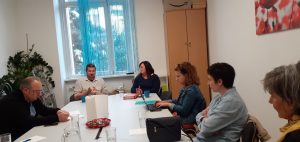 Попладневната сесија беше предвидена за посета на еден од дванаесетте домови за непридружувани деца и деца на улица, деца деликвенти и жртви на трафикинг и проституција. Условите во домот беа презентирани од Доминик и Силвија, социјални работници и одговорни за децата што престојуваат таму. Центрите згрижуваат деца на возраст од 3 – 14 г. Постапуваат по пријава од било кој за загрозувачка состојба на дете. Во Виена има и 3 центри за деца од 14 – 18 години. Машките се одвоени од женските. Децата одат во училиште и имаат помош окулу домашните задачи. Целта е да се вратат дома. Затоа работат психолози заедно со нив. Интересно е дека центрите се отворени, т.е. не се заклучуваат. Нудат престој од максимум 6 седмици во кој период треба да се реши ситуацијата. Првите 8 дена работат да се врати дома, а потоа го предаваат на суд за старателство. Повеќето од штитениците се повратинци. Штитениците се задоволни од центрите, имаат изградено доверба со полицијата. За трафикуваните деца најважна е координацијата, соработката со земјата на потекло. Центрите се врзани со еден информатички систем и тоа им ја олеснува многу работата.
Попладневната сесија беше предвидена за посета на еден од дванаесетте домови за непридружувани деца и деца на улица, деца деликвенти и жртви на трафикинг и проституција. Условите во домот беа презентирани од Доминик и Силвија, социјални работници и одговорни за децата што престојуваат таму. Центрите згрижуваат деца на возраст од 3 – 14 г. Постапуваат по пријава од било кој за загрозувачка состојба на дете. Во Виена има и 3 центри за деца од 14 – 18 години. Машките се одвоени од женските. Децата одат во училиште и имаат помош окулу домашните задачи. Целта е да се вратат дома. Затоа работат психолози заедно со нив. Интересно е дека центрите се отворени, т.е. не се заклучуваат. Нудат престој од максимум 6 седмици во кој период треба да се реши ситуацијата. Првите 8 дена работат да се врати дома, а потоа го предаваат на суд за старателство. Повеќето од штитениците се повратинци. Штитениците се задоволни од центрите, имаат изградено доверба со полицијата. За трафикуваните деца најважна е координацијата, соработката со земјата на потекло. Центрите се врзани со еден информатички систем и тоа им ја олеснува многу работата.

